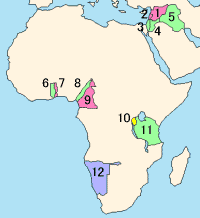Mandat Liga Bangsa-Bangsa


Mandat Liga Bangsa-Bangsa adalah sebuah status hukum bagi wilayah tertentu yang diserahkan dari satu negara ke negara lainnya setelah Perang Dunia I, atau instrumen hukum yang terdiri dari syarat-syarat yang disetujui oleh dunia internasional untuk mengurus suatu wilayah atas perantara Liga Bangsa-Bangsa. Sistem "mandat" memiliki ciri traktat dan konstitusi, yang mengandung klausa-klausa hak minoritas yang memberikan hak untuk membawa kasus ke Pengadilan Internasional.[1] Sistem mandat tersebut ditetapkan oleh Pasal 22 Perjanjian Liga Bangsa-Bangsa, yang mulai berlaku pada 28 Juni 1919. Setelah pembubaran Liga Bangsa-Bangsa pada masa menjelang berakhirnya Perang Dunia II, Konferensi Yalta mengatur bahwa mandat-mandat yang tersisa akan menjadi wilayah perwalian Perserikatan Bangsa-Bangsa, yang akan didiskusikan statusnya kemudian hari. Maka dari itu, sebagian besar mandat Liga Bangsa-Bangsa yang masih tersisa (kecuali Afrika Barat Daya) kemudian diubah statusnya menjadi Wilayah Perwalian Perserikatan Bangsa-Bangsa.
Sumber dan referensi
[sunting | sunting sumber]- Nele Matz, Civilization and the Mandate System under the League of Nations as Origin of Trusteeship, in: A. von Bogdandy and R. Wolfrum, (eds.), Max Planck Yearbook of United Nations Law, Volume 9, 2005, p. 47-95.
- Tamburini, Francesco "I mandati della Società delle Nazioni", in «Africana, Rivista di Studi Extraeuropei», n.XV - 2009, pp. 99–122.
- Anghie, Antony "Colonialism and the Birth of International Institutions: Sovereignty, Economy, and the Mandate System of the League of Nations" 34(3) New York University Journal of International Law and Politics 513 (2002)
- WorldStatesmen - links to each present nation
Referensi
[sunting | sunting sumber]- ^ "Legal Consequences for States of the Continued Presence of South Africa in Namibia (South West Africa) notwithstanding Security Council Resolution 276 (1970)" (PDF). International Court of Justice: 28–32. 21 June 1971. Diarsipkan dari versi asli (PDF) tanggal 2015-01-06. Diakses tanggal 28 August 2010.
Bacaan tambahan
[sunting | sunting sumber]- Anghie, Antony. "Colonialism and the Birth of International Institutions: Sovereignty, Economy, and the Mandate System of the League of Nations." NYUJ Int'l L. & Pol. 34 (2001): 513.
- Bruce, Scot David, Woodrow Wilson's Colonial Emissary: Edward M. House and the Origins of the Mandate System, 1917–1919 (University of Nebraska Press, 2013).
- Callahan, Michael D. Mandates and empire: the League of Nations and Africa, 1914–1931 (Brighton: Sussex Academic Press, 1999)
- Haas, Ernst B. "The reconciliation of conflicting colonial policy aims: acceptance of the League of Nations mandate system," International Organization (1952) 6#4 pp: 521–536.
- Hall, H. Duncan. Mandates, Dependencies and Trusteeship (1948) online
- Margalith, Aaron M. The International Mandates (1930) online
- Matz, Nele. "Civilization and the Mandate System under the League of Nations as Origin of Trusteeship." Max Planck Yearbook of United Nations Law (2005) 9#1 pp. 47–95. online
- Pedersen, Susan. The Guardians: the League of Nations and the Crisis of Empire, (New York: Oxford University Press, 2015)
- Sluggett, Peter. "An improvement on colonialism? The 'A' mandates and their legacy in the Middle East," International Affairs (2014) 90#2 pp. 413–427. On the former Arab provinces of the Ottoman Empire
- Wright, Quincy. Mandates under the League of Nations (1930), 730 pp; Comprehensive coverage